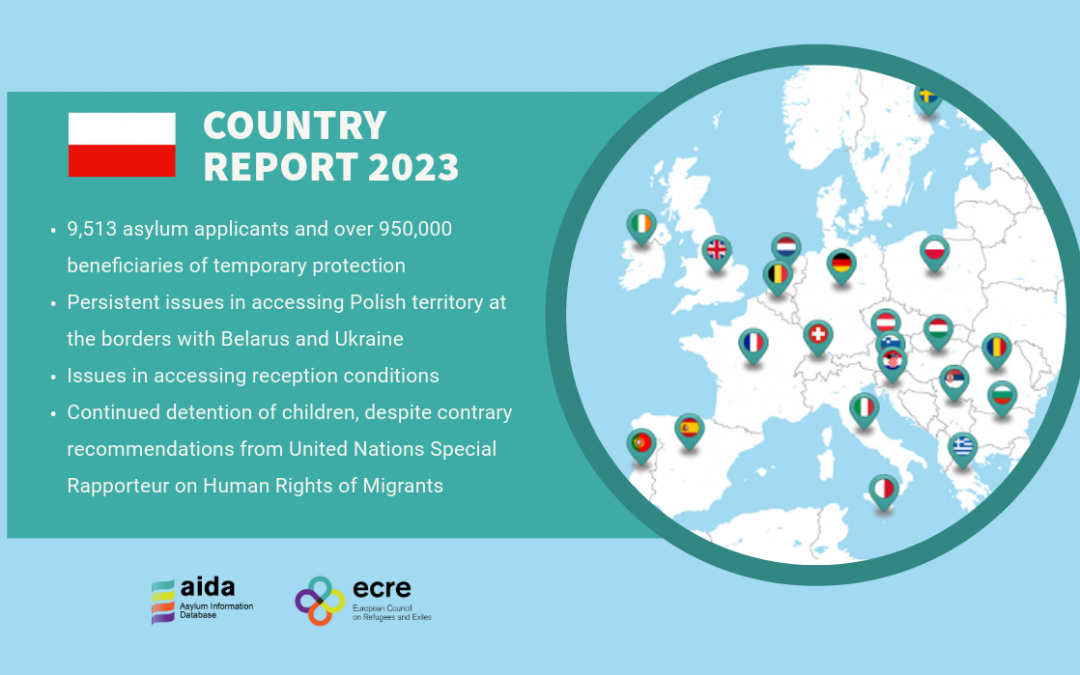The updated AIDA Country Report on Poland provides a detailed overview of legislative and practice-related developments in asylum procedures, reception conditions, detention of asylum seekers and content of international protection in 2023. It also includes an annex which provides an overview of temporary protection (TP).
9,513 people, including 2,375 children, applied for international protection in Poland in 2023. Most applicants (over 75%) were from Belarus, Ukraine and Russia. However, access to Poland and the asylum procedure at the country’s border with Belarus remained a major challenge. According to official data, 2,425 refusals of entry were issued at border crossings in 2023. The actual number of people seeking protection is unknown. NGOs continued to report the use of verbal and physical violence by the Border Guard and other forces in 2023. Despite challenges before domestic courts, legal amendments restricting access to asylum for those accessing the territory irregularly remain in force. As of 31 January 2024, the European Court of Human Rights had communicated 11 cases regarding pushbacks at the Polish-Belarusian border. They involved 84 third country nationals, including 16 minors, mainly from Afghanistan, Iraq and Syria.
Although reception capacity and overcrowding were not a major issue in Poland in 2023, some practical obstacles to accessing reception conditions remained. As in previous years, the most prominent issues were access to reception conditions following detention due to the difficulties in travelling from detention centres to reception centres within the two day deadline, and the humanitarian crisis at the border with Belarus which left prospective applicants stuck at the border or pushed back without access to the asylum procedure and thus reception conditions, including healthcare. Although conditions in reception centres are deemed to be better than in the past, they continue to be rather low.
Concerns regarding detention remain. Children are still detained on a regular basis and their best interests are not taken into account in court proceedings. According to the Border Guard Headquarters, 115 accompanied children and 29 unaccompanied children were in detention centres in 2023. Additionally, no identification system for victims of violence is in place and victims of torture are placed in detention centres where they have limited access to psychological assistance. In 2023, the United Nations Special Rapporteur on the Human Rights of Migrants published a report on their 2022 visit to detention centres in Poland. It highlighted the need to use reception facilities rather than detention centres in cases of both accompanied and unaccompanied children, pregnant women and people with mental health conditions.
While Poland’s initial response to the full-scale invasion of Ukraine was positive in terms of granting access to its territory, the trend of restricting access, which was observed at the end of 2022, continued in 2023 with over 13,000 decisions to refuse entry issued at the Polish-Ukrainian border. Access to TP was particularly hampered for certain groups, including stateless people and Roma. In addition, 363 unaccompanied children who had been in Ukrainian foster care in 2023 were returned to Ukraine at the request of their guardians despite opposition from both Polish and international human rights organisations. Freedom of movement of TP beneficiaries also continued to be hampered by unfavourable practices by the Polish Border Guard and the fact that TP is withdrawn after a 30-day absence from Poland. In these circumstances, many TP beneficiaries have lost access to social benefits and their reinstatement has proven very difficult in practice.
Partial progress was made regarding access to residence permits for minors in 2023. However, not all minors who are currently benefiting from TP are able to obtain them. In addition, access to mental healthcare proved particularly difficult as Ukrainian psychologists were not allowed to provide treatment for Ukrainian nationals between August 2023 and June 2024.
Two TP mechanisms are currently active in Poland: a general one based on the 2003 Act on Protection, and a special one based on the Special Law, which was adopted in March 2022. As of 13 February 2024, there were 952,109 special TP beneficiaries. As of 31 December 2023, there were 1,343 general TP beneficiaries. TP beneficiaries have access to most of the rights provided for in the TP Directive but there are differences based on their status as either special or general TP beneficiaries.
The full report is available here and the annex on temporary protection is available here.
For more information about the AIDA database or to read other AIDA reports, please visit the AIDA website.

